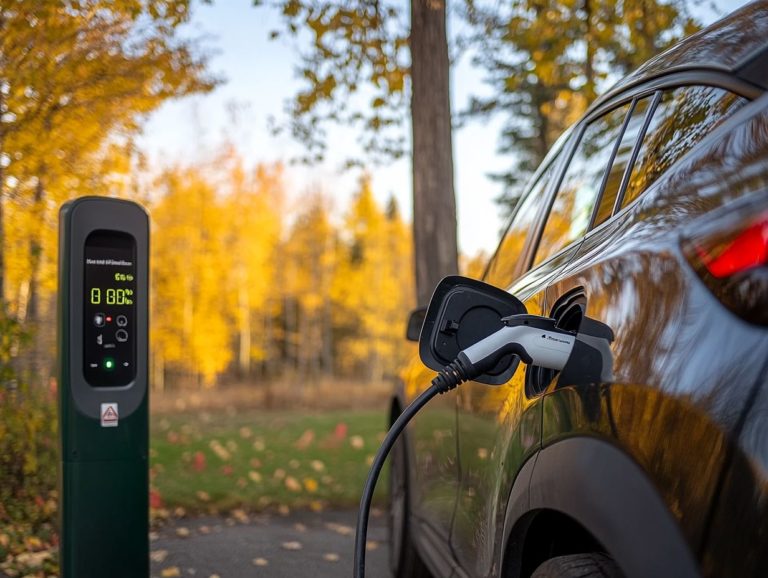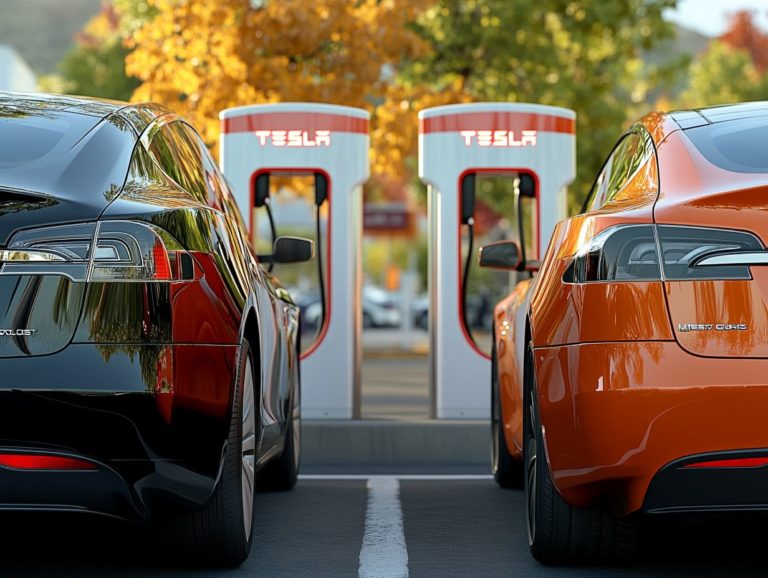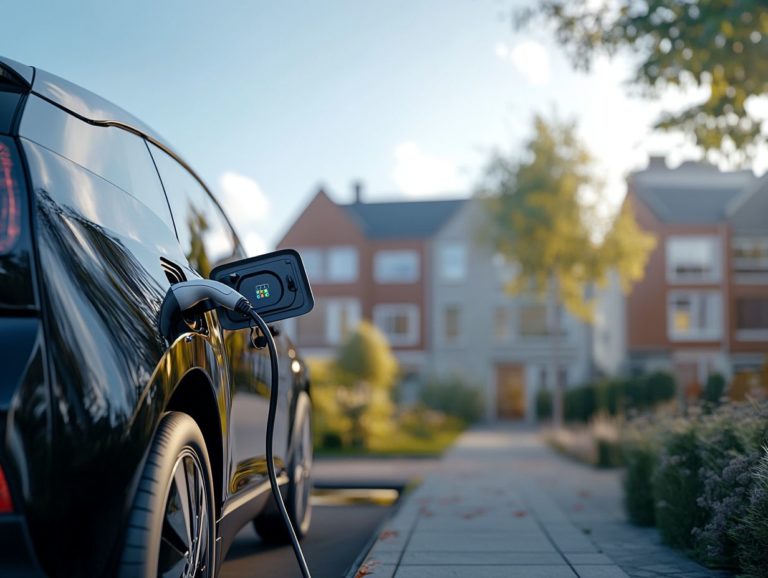Are There Any Disadvantages to Electric Cars?
Electric cars are changing the way we think about transportation! They usher in a future that is cleaner and more efficient.
This article delves into the essentials of electric vehicles, showcasing their fundamental features and the numerous benefits they provide, especially regarding environmental impact and cost savings. Consider some drawbacks, like limited driving range and charging challenges.
We ll also explore innovative solutions designed to tackle these issues, empowering you to weigh the pros and cons effectively.
Contents
- Key Takeaways:
- Overview of Electric Cars
- Advantages of Electric Cars
- Disadvantages of Electric Cars
- Addressing the Disadvantages
- Frequently Asked Questions
- What are the main disadvantages of electric vehicles?
- Are there any environmental disadvantages to using electric vehicles?
- Do electric vehicles have any performance disadvantages?
- Are there any disadvantages to owning an electric vehicle in terms of maintenance?
- Do electric vehicles have any disadvantages in terms of convenience?
- Are there any safety concerns with electric vehicles?
Key Takeaways:

- Electric cars have a shorter driving range compared to gas cars.
- While the initial cost is higher, savings on fuel and maintenance can be substantial.
- The current charging infrastructure is less developed than gas stations, which can be a challenge for those without home charging access. Innovations are being developed to address this issue.
Overview of Electric Cars
Electric cars are a game-changer in the automotive world. They offer a sustainable alternative to conventional petrol vehicles. These electric vehicles (EVs) are designed to use electricity, resulting in a marked decrease in CO2 emissions, which contribute to climate change, typically linked to gas-powered cars.
With significant improvements in battery range and efficiency, electric cars now present an attractive option for those seeking to lower their carbon footprint while enjoying the conveniences of contemporary mobility.
Advantages of Electric Cars
Electric cars present many advantages that make them appealing to both eco-conscious consumers and budget-savvy individuals. Their environmental benefits stand out, but the long-term cost savings truly elevate their appeal.
Environmental Benefits
The environmental benefits of electric cars are striking, especially when you consider their remarkable ability to cut CO2 emissions significantly compared to conventional petrol vehicles.
Research indicates that electric vehicles can produce up to 70% fewer greenhouse gas emissions over their lifetime, accounting for the entire energy cycle. This impressive reduction is largely due to their efficiency and the innovative ways they harness power. Charging these vehicles using renewable energy sources, such as wind, solar, and hydroelectric power, makes the decrease in emissions even more significant.
For example, reports have shown that switching to electric cars powered by solar energy can dramatically reduce not just your carbon footprint but also contribute to slowing down climate change.
As the energy grid evolves toward renewable resources, the overall environmental health of our planet stands to improve substantially. This transition to electric mobility is not merely a personal choice; it s a collective necessity that can drive meaningful change.
Cost Savings
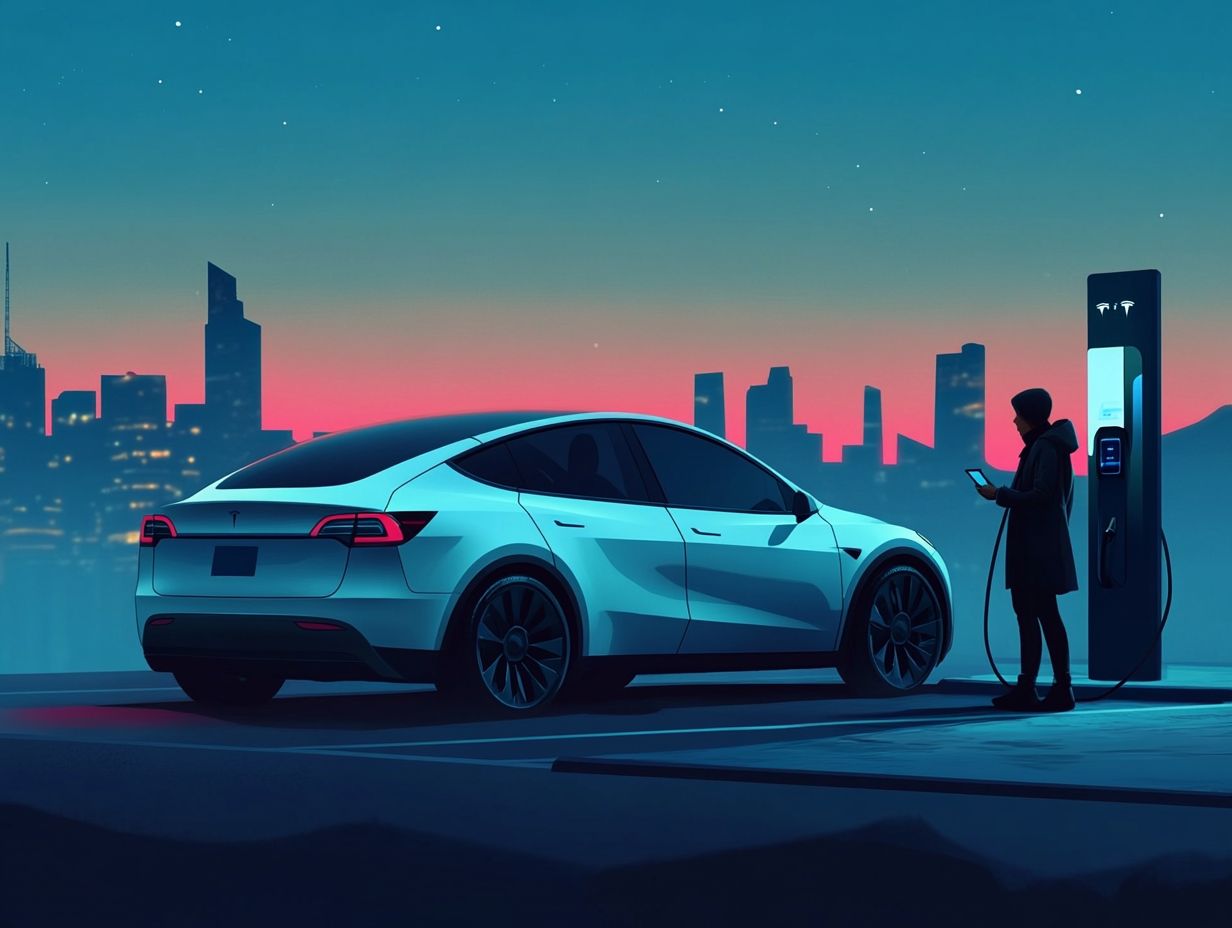
The cost savings associated with electric cars can be remarkable, especially when you consider the lower maintenance costs and the more affordable price of electricity compared to petrol.
Studies indicate that as an electric vehicle owner, you could save up to 50% on maintenance expenses over the life of your vehicle. This is largely because electric engines have fewer moving parts and require servicing less frequently.
With the average cost of electricity sitting at around $0.13 per kWh versus approximately $3.00 per gallon for petrol, fueling your electric car is significantly cheaper. Additionally, some states offer tax credits that can reduce the overall cost by thousands, making the switch to electric not only an environmentally responsible choice but also a financially astute one.
Disadvantages of Electric Cars
While electric cars offer numerous benefits, there are also several drawbacks to consider as a potential buyer. These include a limited driving range and higher initial costs when compared to traditional petrol vehicles. It’s important to be aware of common myths about electric vehicles that may influence your decision.
Limited Driving Range
One of the primary concerns for you as a potential electric car buyer is the limited driving range that many electric vehicles offer. These often fall short compared to petrol cars.
For instance, the Peugeot e-208 provides about 217 miles on a full charge. In contrast, Tesla’s Model 3 impressively reaches up to 358 miles.
These differences highlight the critical role of advancements in battery technology aimed at extending these ranges. Recent strides in lithium battery efficiency promise to enhance your driving experience and tackle reliability issues, making electric vehicles more appealing.
As you and other drivers gain confidence in the capabilities of these modern electric vehicles, get ready for a remarkable change in car ownership!
Higher Upfront Cost
The upfront cost of electric cars often exceeds that of traditional petrol vehicles. This higher price mainly arises from the complex manufacturing process and the expensive lithium batteries needed for these cars.
The intricate assembly techniques and the need for specialized materials further drive up the overall cost.
However, you might discover some relief through various tax incentives and rebates available at both state and federal levels. These financial benefits can significantly offset those initial costs, making electric vehicles a more attractive option for your wallet in the long run.
Charging Infrastructure Challenges
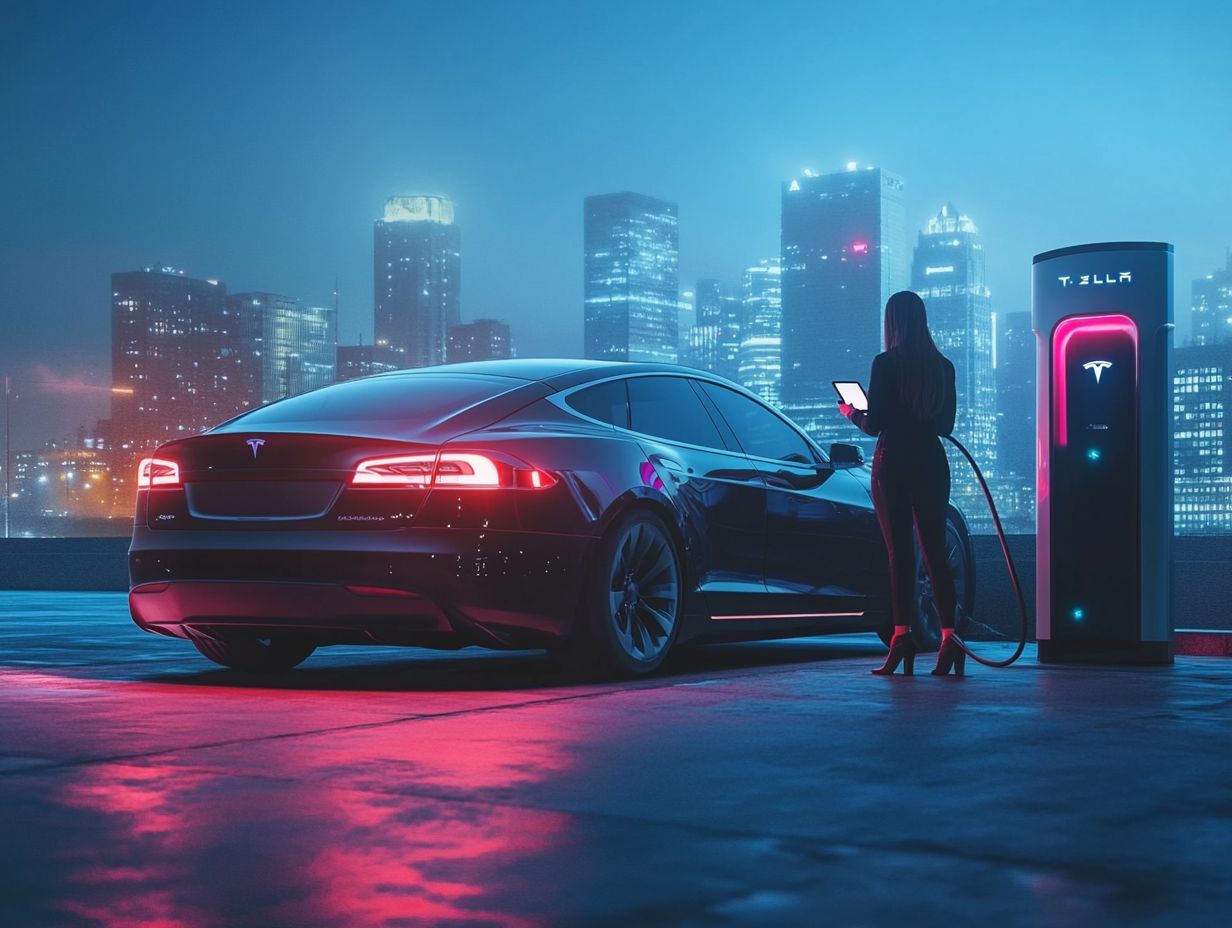
Charging infrastructure can be a challenge for electric vehicle owners. The number of charging points available varies greatly by location, affecting how practical it is to own an electric car.
In places like Chile and Argentina, the rise in electric vehicles has spurred efforts to enhance charging accessibility, yet significant gaps remain, especially in rural areas.
On the flip side, China has made impressive advancements, featuring an extensive network of charging stations that is essential for achieving its ambitious EV goals.
Countries such as Bolivia and the Democratic Republic of Congo face unique obstacles that impede infrastructure development. Initiatives like the Bipartisan Infrastructure Law in the United States serve as exemplary models for nations eager to bolster their charging facilities, striving to create a more inclusive landscape for electric vehicle users.
Addressing the Disadvantages
To overcome the challenges of electric cars, a range of innovative solutions is being developed to extend battery lifespan and reduce charging time. These improvements will make electric vehicles more appealing to consumers.
Innovations and Solutions
Recent advancements in electric car technology are set to enhance battery life and energy efficiency. These changes directly address your concerns as a consumer and make electric vehicles more attractive to a broader audience.
New designs are optimizing energy density, enabling longer drives on a single charge. Meanwhile, cutting-edge energy management systems improve overall performance by intelligently regulating power distribution and consumption.
You ll also notice a noteworthy shift toward integrating renewable energy sources, such as solar and wind, at charging stations. This reduction in carbon footprint promotes a more sustainable energy future.
These progressive changes promise to elevate your driving experience while contributing to a greener planet.
Weighing the Pros and Cons
If you re thinking about buying an electric vehicle, weigh the pros and cons. Make sure they fit your needs and lifestyle.
Think carefully about how an electric vehicle fits into your daily routine. Consider factors like your typical commute distance, access to charging stations, and how the cost of energy compares to gasoline. Balancing the environmental benefits like reduced emissions with potential downsides, such as limited range (the distance an electric vehicle can travel on a single charge) and longer refueling times (the time it takes to recharge an electric vehicle compared to filling a gas tank) can significantly guide your decision-making process.
Also, consider the financial factors carefully. Reflect on the initial purchase price, available tax incentives, and maintenance costs, as these elements will play a crucial role in determining how well an electric car fits into your personal budget.
Frequently Asked Questions
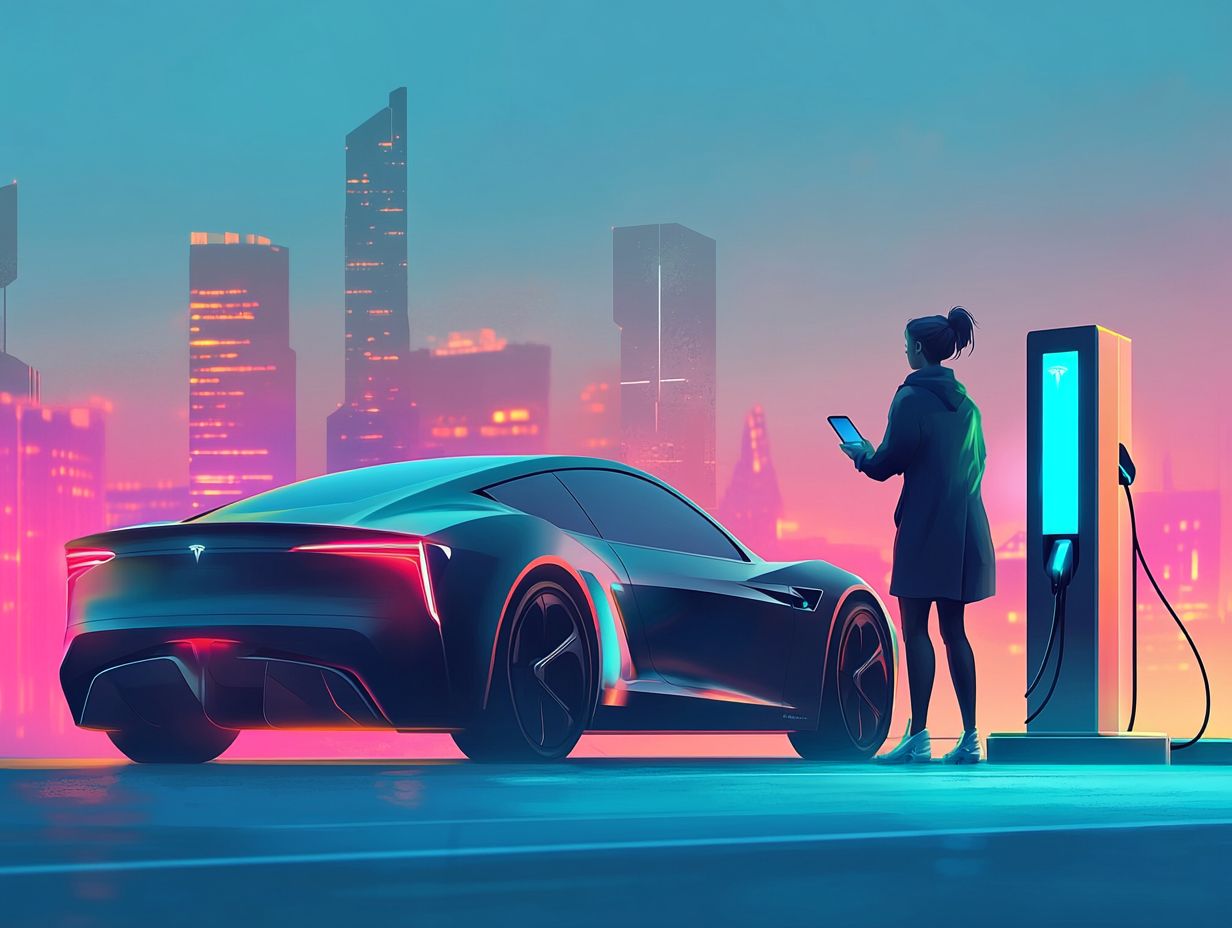
What are the main disadvantages of electric vehicles?
The main disadvantages of electric vehicles are limited range, long charging times, and higher upfront costs compared to traditional gasoline cars, as detailed in the pros and cons of EV ownership.
Are there any environmental disadvantages to using electric vehicles?
While electric vehicles produce no emissions while being driven, their production and disposal can have negative environmental impacts due to the materials and energy required.
Do electric vehicles have any performance disadvantages?
Electric vehicles generally have slower acceleration and lower top speeds compared to gasoline cars due to their electric motors and battery limitations.
Are there any disadvantages to owning an electric vehicle in terms of maintenance?
Electric vehicles have fewer moving parts compared to traditional cars, but their batteries and electric motors may require specialized maintenance that can be more expensive.
Do electric vehicles have any disadvantages in terms of convenience?
One disadvantage of electric vehicles is the need to find and use charging stations, which can be less convenient compared to simply filling up at a gas station.
Are there any safety concerns with electric vehicles?
Electric vehicles have been shown to be just as safe as gasoline cars, but there may be increased risks due to the high-voltage components used in their powertrain.

